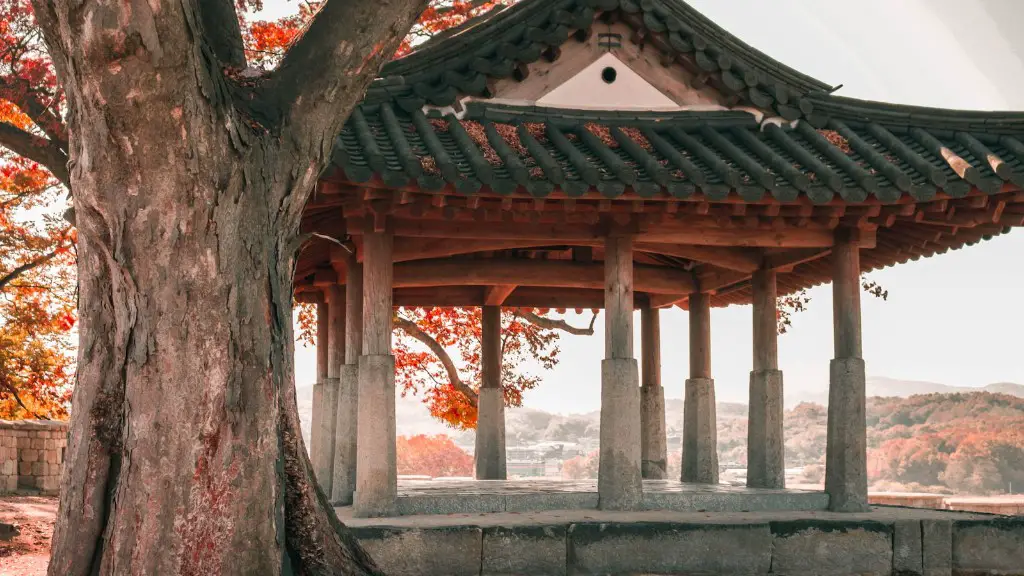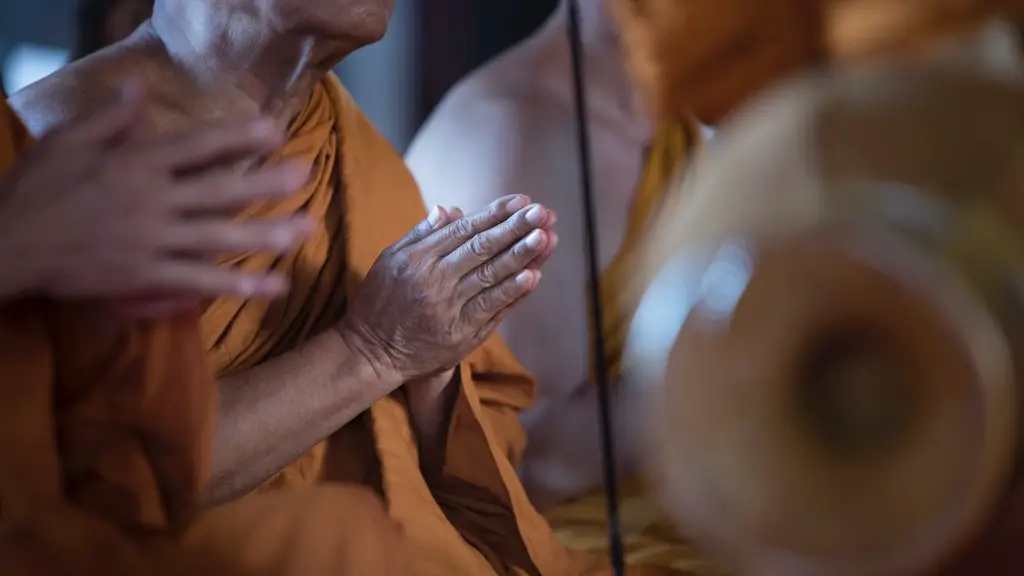Suffering is an unavoidable part of life, no matter which religion we follow. For Hindus, this is the result of the law of Karma. The core belief of Hinduism states that one’s present situation and the suffering that comes with it, is the result of one’s own good and bad deeds from a previous life.
According to Hindus, each and every action that is done in this life creates an corresponding reaction in the form of thoughts, words and deeds, which will manifest in either present or later life. Each and every person is accountable for the actions they do in their current life and the consequent results are the reactions of karmas that have been done in the past life.
Furthermore, suffering can also be viewed as a part of our spiritual growth. It gives us the space to leave behind our ego and increase our connection to the divine. By enduring suffering and not giving in to instant gratification, we can learn valuable lessons and grow in spirit. For this reason, many Hindus look not only at their present circumstances, but also at the larger purpose of their suffering in order to better understand their life experiences.
However, Hindus believe that suffering can also be relieved by the practice of the Dharma. Dharma is the collective term for a wide range of practices that help us to live in alignment with the cosmic laws and make our lives more meaningful. Hindus strive to adhere to their Dharma by following the four main paths, Dharma (duty), Artha (wealth), Kama (pleasure) and Moksha (liberation). By living in accordance to the Dharma, one can find contentment and happiness in this life, despite the suffering that is unavoidable.
Suffering can also be caused by the mass delusion of Māyā. Māyā is the Hindu concept of the illusions that blind us to our true nature. These illusions of life such as ambition, desires and attachment to material things, lead us to suffer as we try and strive to satisfy these cravings and achieve false purpose. Therefore, suffering can also be attributed to this lack of enlightenment.
Ultimately, Hinduism offers a range of answers to the question of suffering. The cause of suffering can be seen as religious and spiritual, but it is also attributed to the law of Karma, the pursuit of the Dharma, and Māyā. As Hindus, we are taught to accept suffering as part of life, but also to strive for the liberation from suffering and the achievement of Moksha.
How To Deal With Suffering In Hinduism
Hinduism presents a range of strategies for dealing with suffering which vary between different beliefs, sects and beings. Firstly, Hindus generally turn to the practice of meditation and yoga which is seen as a way to learn from our suffering and find respite from pain. By taking the time to allow one’s mind to become still, it is thought that we can more easily accept our suffering and make sense of it.
Also, some Hindus believe that suffering can be relieved by chanting mantras, which are mystical syllables or words that invoke spiritual energy. Hindu’s believe that through chanting, we can reconnect ourselves to the Divine and experience inner peace and understanding which can bring relief from suffering.
In addition, many Hindus turn to prayer and offerings in order to connect more deeply with the Divine and seek comfort and solace. This can be done by reciting prayers, making offerings such as food or incense, or worshiping the Divine in whatever form resonates with the individual.
Overall, the three main ways Hindus deal with suffering are meditation and yoga, chanting mantras, and making offerings and prayers. Each of these ways provides an individualized approach and brings inner peace and comfort though allowing one to reconnect to the Divine.
What Is The Role Of The Divine In Suffering?
Many Hindus believe that suffering is a part of life and that the Divine has a role in suffering in order to teach us lessons and lead us to growth. By examining the cause of our suffering and understanding why it happens, one can remain open to learning from it and experience spiritual growth. Whether it is a personal or a collective suffering, Hindus see it as a test from the divine to reveal our inner strength.
Hindus are taught to accept their suffering with faith and trust that it is part of the Divine plan. All of our suffering serves a purpose and is intended to aid us in our journey towards enlightenment. By having faith in the Divine, Hindus accept their suffering as necessary and strive to use it as a stepping stone towards inner growth.
Furthermore, Hindus also believe that the Divine is with us during our time of suffering and difficulty. The Divine can provide comfort and guidance by lending strength to those who are struggling and helping them navigate their challenging times. Thus, by having faith in the Divine, suffering can be endured more easily.
Ultimately, Hindus teach us that the Divine has an important role in suffering. The Divine tests us to reveal our inner strength and remind us of the power of faith. When we are suffering, it should not be seen as a burden, but rather as an opportunity for growth and connection to the Divine.
What Is The Role Of Karma In Suffering?
Karma is a major component of Hinduism and its role in suffering is largely based on the law of cause and effect. Hindus believe that good and bad deeds from past lives are the cause of suffering in the current life. The action of karmas, or deeds, creates an effect, or consequence, which manifests in the present life or a later life depending on how it is cultivated. The effects can be seen as positive or negative, and this then defines our present situation.
Furthermore, karma can also be explained by looking at the three Gunas, or qualities of our nature. These three qualities are Satva (purity and clarity), Rajas (passion and emotion), and Tamas (dullness and ignorance), which are all seen as necessary in life. If a majority of the actions we do are in line with one of the Gunas, they will carry the same weight and influence our current situation.
Karma is also said to be a form of cosmic justice, as it ensures that all our good and bad deeds are ultimately balanced. According to Hindus, the only way to neutralize negative karma, and thereby alleviate suffering, is to do good deeds, or puja. This can be done through acts of kindness, service, and charity.
Therefore, karma is seen as a major factor in suffering, as all our past deeds come back to haunt us in this life in the form of pain and suffering. The only way to combat this is to do good deeds and strive to purify ourselves from the karmic effects, so that we can experience joy and peace in our lives.
What Is The Relationship Between Suffering And The Divine?
Hindus believe suffering is part of life and has a purpose in our spiritual growth. They deem that every suffering one encounters can only be overcome by connecting to the Divine, as it can provide guidance and comfort during these difficult times. Pain and suffering are both seen as part of life, but it is believed that understanding their origin and embracing them can enable one to overcome them and find connection to the Divine.
Suffering can also be viewed as a medium for understanding the Divine, as it is through our struggles that we can better comprehend the power of faith and the role of the Divine in our lives. Our suffering ultimately brings us closer to the divine, and this is why Hindus use prayer and offerings to connect and seek solace from the divine.
Furthermore, having faith in the Divine is seen as essential during times of suffering, as it brings hope and strength to those who are struggling. Hindus see the Divine as a source of comfort and believe that it can give peace and understanding when needed.
Overall, Hindus believe in an intimate relationship between suffering and the Divine. By connecting to the Divine, Hindus can endure suffering more easily and gain knowledge and understanding from it. Suffering is used as a tool to help us to connect to the Divine and establish an understanding of the role of faith in our lives.


